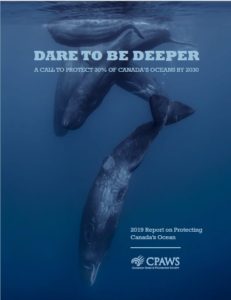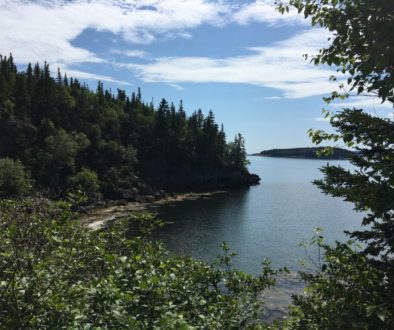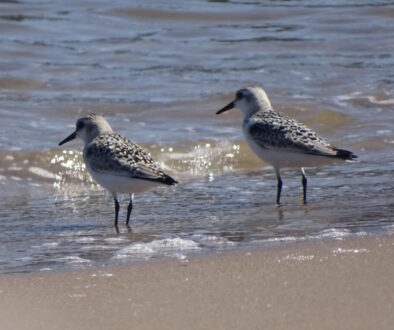Progress on ocean protection hailed in New Brunswick, new challenge issued for 2030
June 3, 2019, Fredericton – A report released today by the Canadian Parks and Wilderness Society (CPAWS) finds that Canada has made more progress in the past three years in protecting its ocean territory than ever before in the country’s history.
In New Brunswick, about 2000 km2 of fisheries closures in the Gulf of St. Lawrence are now being managed as marine refuges to protect juvenile lobster habitats and Miramichi Bay salmon populations.
“CPAWS New Brunswick is pleased that more of the oceans around our province are being managed with greater focus on long-term protection. We are encouraging governments to work together to improve the levels of protection for these marine refuges, so we can rely on them to protect all ocean life from all kinds of damaging developments. This is especially important for locally important lobsters, wild Atlantic salmon, endangered winter skate, and the food sources for North Atlantic right whales,” says Roberta Clowater, Executive Director, CPAWS New Brunswick.
 Among countries with similar extents of ocean territory, Canada now stands in the middle in terms of proportion protected. Canada made a commitment to protect 10 percent of its ocean territory by 2020 when it signed on to the latest UN Convention on Biological Diversity action plan in 2010.
Among countries with similar extents of ocean territory, Canada now stands in the middle in terms of proportion protected. Canada made a commitment to protect 10 percent of its ocean territory by 2020 when it signed on to the latest UN Convention on Biological Diversity action plan in 2010.
However, in early May, the International Science-Policy Platform on Biodiversity and Ecosystem Services released a report showing that species’ rates of survival have rapidly worsened in the past few decades. In response, CPAWS is declaring that Canada now needs to set a larger goal of protecting 30 percent of its ocean territory by 2030.
“Thirty percent is the minimum that scientists recommend we protect to give marine species the best possible hope of survival. As we document, this goal is absolutely achievable for Canada, given the amount of preliminary work that has already occurred to identify future marine areas for conservation. Eventually we need to get to 50%. What is required is the political will to keep moving forward. We already know that Canadians strongly support increasing the level of ocean protection,” says Sabine Jessen, National Director of CPAWS’ Ocean Program.
The CPAWS report contains a detailed blueprint for how Canada can achieve 30% ocean protection by 2030.
CPAWS also congratulates the federal government for amending its policies and rules for new marine protected areas this year to ensure that all harmful practices to wildlife are prohibited within their borders.
“This policy change was long overdue and we’re extremely pleased to see it happen. We are strongly recommending that the government apply these new policies and rules to all of Canada’s existing marine protected areas and refuges, ” adds Jessen.
Canada has one of the largest ocean territories and the longest coastline of any nation, bordering the Atlantic, Pacific and Arctic oceans and covering nearly six million km2.
As Canada’s voice for wilderness, CPAWS has been a strong advocate for improved marine protection for the past 25 years, working in partnership with all levels of government, community groups, Indigenous Peoples and scientists.
In New Brunswick, CPAWS has been working with local communities and all levels of governments since 2004 to encourage and support more long-term marine conservation. Clowater adds, “Next steps for ocean conservation in New Brunswick include working on marine protected areas networks in the Bay of Fundy and Gulf of St. Lawrence. This should include the former Shediac Valley Area of Interest, off the northeastern coast of New Brunswick, which has been the center of North Atlantic right whale feeding activity for the past three years, in addition to being spawning and nursery grounds for Atlantic cod and yellowtail flounder.”
-30-
For interviews, please contact: Roberta Clowater, rclowater@cpaws.org ; phone: 506-452-9902
Download the report: “Dare to Be Deeper – A Call to Protect 30% of Canada’s Ocean by 2030”.
Photos available on request.
Roberta Clowater, executive director of CPAWS NB, discusses the report with the Gary Moore, host of Shift, CBC Radio in New Brunswick.


